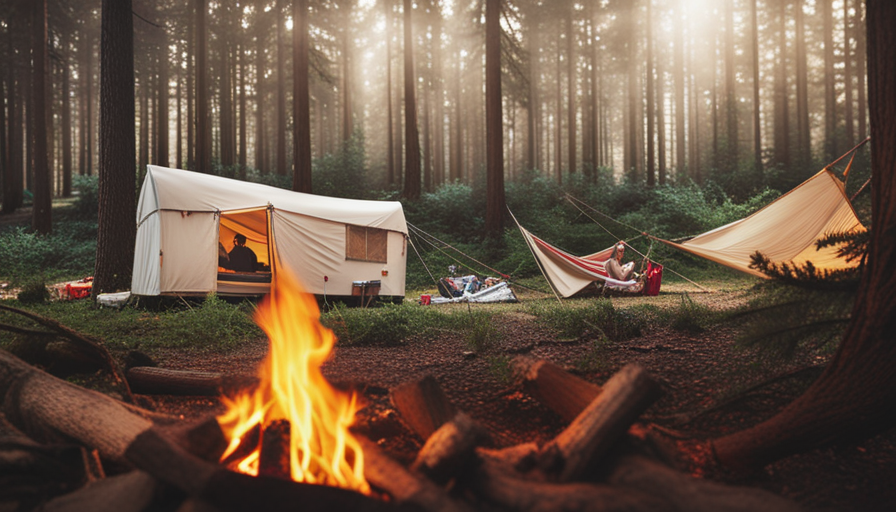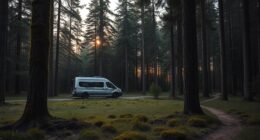Have you ever dreamt of setting off on a road trip, embracing the freedom to explore new places and waking up to a different view every day? Embracing the camper lifestyle can bring those dreams to life. In this article, I’ll guide you through the ins and outs of living in a camper, providing important tips and suggestions to fully immerse yourself in and succeed in this unique way of living.
From choosing the perfect camper vehicle to planning your route and destinations, organizing your living space to managing your finances, I will cover it all.
We’ll also delve into the challenges you may face on the road and how to overcome them, while embracing the benefits of a minimalist lifestyle. Whether you’re a seasoned traveler or just starting out, this article will provide you with the knowledge and inspiration to live your best life on the road.
So buckle up, and let’s embark on this thrilling adventure together!
Key Takeaways
- Choose the right camper vehicle based on size, features, and mobility options.
- Plan routes and destinations with a flexible itinerary, considering national parks and off-grid camping spots.
- Maximize storage and create functional areas in the living space.
- Budget for expenses, including accommodation, food, utilities, and transportation costs.
Choosing the Right Camper Vehicle
When choosing the right camper vehicle, it’s crucial to carefully consider the size, features, and mobility options that the vehicle offers.
Finding the right size camper is essential to ensure comfort and convenience during your travels. If you’re planning to live in a camper full-time, a larger vehicle with ample living space would be ideal. On the other hand, if you’re looking for a camper for occasional trips, a smaller and more compact option might be sufficient.
Researching camper brands is also important to make an informed decision. Look for reputable brands that are known for their quality and durability. Reading reviews and comparing different models will give you a better understanding of what each brand has to offer. Additionally, consider features such as sleeping arrangements, kitchen facilities, bathroom amenities, and storage space.
Once you have chosen the right camper vehicle, the next step is planning your route and destinations. This involves deciding on the places you want to visit, the activities you want to engage in, and the duration of your trip. It’s important to have a flexible itinerary that allows for unexpected detours and spontaneous adventures.
By carefully planning your route and destinations, you can make the most out of your camper living experience and create unforgettable memories on the road.
Planning Your Route and Destinations
As you map out your journey, consider the breathtaking national parks and charming small towns that you can explore along the way. Planning your itinerary is an essential part of living in a camper. It allows you to maximize your time and experience the most beautiful destinations. To help you plan, I’ve created a table below that outlines some popular national parks and off-grid camping spots that are worth visiting:
| National Parks | Off-Grid Camping Spots |
|---|---|
| Yellowstone | Mojave Desert |
| Grand Canyon | Olympic National Park |
| Yosemite | Great Smoky Mountains |
| Rocky Mountain | Joshua Tree National Park |
These are just a few examples, but there are countless other incredible places to discover. When planning your route, consider the distance between destinations, the availability of amenities, and the activities you want to participate in. It’s also important to research any necessary permits or restrictions for camping in certain areas. By carefully planning your route and destinations, you can create a memorable and enjoyable camper living experience.
Now that you have your route planned, it’s time to organize your living space and make it as comfortable as possible.
Organizing Your Living Space
Get ready to transform your mobile home into a cozy oasis by organizing your living space to create a comfortable and inviting atmosphere.
When living in a camper, maximizing storage is essential. With limited space, it’s important to make the most of every nook and cranny. Use bins, baskets, and drawer organizers to keep everything in its place. Utilize vertical space by installing shelves or hanging organizers on the walls.
Creating functional living areas is also crucial in a camper. Divide your space into different zones, such as a sleeping area, dining area, and work area. Use curtains or room dividers to separate these spaces and add a touch of privacy. Invest in multipurpose furniture, like a sofa that can also be used as a bed or a table that can fold up when not in use.
By organizing your living space effectively, you can maximize the comfort and functionality of your camper.
Now that your space is organized, it’s time to move on to maintaining your camper and ensuring it stays in top condition. Transitioning into the next section, we’ll explore the necessary steps to keep your mobile home in great shape for years to come.
Maintaining Your Camper
To keep your mobile home in tip-top shape, it’s crucial that you maintain and care for it like a doting parent would tend to their precious child. One important aspect of maintaining your camper is ensuring its hygiene. Regularly cleaning and disinfecting surfaces will help prevent the buildup of dirt, bacteria, and odors. Don’t forget to pay extra attention to commonly touched areas like doorknobs and countertops. Additionally, proper ventilation is key to preventing mold and mildew growth. Opening windows and using ventilation fans while cooking or showering can help reduce humidity levels inside the camper.
When it comes to preventing mold and mildew, it’s also important to keep an eye on areas prone to moisture, such as the bathroom and kitchen. Regularly inspect these areas for any signs of dampness or water leaks. If you do notice any issues, address them promptly to prevent further damage.
To emphasize the importance of maintaining camper hygiene, here’s a handy table:
| Tips for Maintaining Camper Hygiene | ||
|---|---|---|
| Clean surfaces regularly | Disinfect commonly touched areas | Ensure proper ventilation |
Taking care of your camper is not only about hygiene but also about managing your finances. By keeping up with regular maintenance and addressing any issues promptly, you can avoid costly repairs down the line.
Managing Your Finances
When it comes to managing finances while living on the road, there are a few key points to consider.
First, budgeting for living expenses is crucial to maintain a sustainable lifestyle. This includes accounting for costs such as fuel, groceries, and maintenance.
Second, finding affordable campgrounds and free camping options can significantly reduce accommodation expenses.
Lastly, saving money on food and utilities is possible through strategies like meal planning, cooking in bulk, and utilizing solar power.
By implementing these practices, I can ensure a financially savvy and enjoyable life on the road.
Budgeting for Living Expenses on the Road
Managing your finances while on the road in a camper can be a thrilling adventure, as you learn to budget for living expenses and make the most of your limited resources.
When it comes to budgeting for transportation, it’s important to consider the cost of fuel, maintenance, and any unexpected repairs. Planning your route ahead of time and researching the most affordable gas stations can help you save money.
Additionally, finding part-time work opportunities along the way can provide a steady income to support your lifestyle. Whether it’s picking up odd jobs at local businesses or freelancing online, there are plenty of ways to earn money while on the road.
By carefully managing your expenses and finding creative ways to supplement your income, you can enjoy the freedom of living in a camper without breaking the bank.
Transitioning into the next section, finding affordable campgrounds and free camping options is another important aspect of living in a camper.
Finding Affordable Campgrounds and Free Camping Options
Scouting for budget-friendly campgrounds and scoring free camping spots can be a game of hide and seek, but with a little research, you can uncover hidden gems that won’t burn a hole in your pocket. When it comes to finding remote camping spots, it’s important to think outside the box.
Consider national forests, Bureau of Land Management (BLM) areas, and state parks as they often offer affordable or even free camping options. Additionally, joining camping clubs or organizations can provide access to discounted campgrounds.
Tips for boondocking, or camping off-grid without amenities, include using apps and websites to find dispersed camping areas, practicing Leave No Trace principles, and being self-sufficient with water and power. Remember, saving money on food and utilities is crucial for a successful camper lifestyle.
Transitioning to the next section, let’s explore ways to cut costs on these essential expenses.
Saving Money on Food and Utilities
After finding affordable campgrounds and free camping options, the next step in living in a camper is to save money on food and utilities. Meal planning and cooking hacks become essential when you have limited space and resources in a camper. I’ve learned to make a detailed grocery list and plan meals ahead of time, ensuring that I have all the ingredients I need without wasting any.
Cooking hacks like using a slow cooker or investing in a portable grill have been lifesavers. Another way to save money is by conserving energy and reducing water usage. I make sure to turn off lights and appliances when not in use, and I take quick showers to save water. These small changes really add up and help me to live more sustainably.
Now, let’s talk about staying connected and entertained while living on the road.
Staying Connected and Entertained
To ensure a fulfilling and connected lifestyle while living in a camper, it’s important to find creative ways to stay entertained and connected to the world around you. Despite the nomadic nature of camper living, staying connected and finding entertainment is still very much possible.
One of the easiest ways to stay connected is by investing in a reliable mobile hotspot. This allows you to have internet access wherever you go, ensuring you can stay connected to work, family, or simply browse the web. Additionally, many campgrounds offer WiFi, so taking advantage of this amenity can also help you stay connected.
When it comes to entertainment, there are numerous options available. Many campers enjoy reading books or listening to podcasts, which can be done both offline and online. Streaming services like Netflix and Hulu are also great options, as long as you have a good internet connection. If you prefer a more traditional form of entertainment, board games and card games can provide hours of fun with friends or family.
By staying connected and finding entertainment, living in a camper can be an enriching experience. Embracing a minimalist lifestyle allows for more freedom and flexibility, which I will discuss in the next section.
Embracing a Minimalist Lifestyle
After figuring out ways to stay connected and entertained while living in a camper, it’s time to dive into the next aspect of this lifestyle – embracing a minimalist lifestyle.
Living in a camper requires downsizing and simplifying, which means adopting a minimalist approach to your belongings and daily routines.
One of the first areas to tackle is your wardrobe. Minimalist fashion is all about owning a few versatile pieces that can be mixed and matched, rather than a closet overflowing with clothes. Invest in high-quality basics that can be dressed up or down, and consider donating or selling any excess items.
Embracing a minimalist lifestyle extends beyond just fashion. It’s also about finding tiny home alternatives for your everyday needs. Look for compact and multifunctional products that can serve multiple purposes, such as collapsible furniture or storage solutions. This will help you make the most of the limited space in your camper.
Transitioning into the next section, while embracing a minimalist lifestyle in a camper has its perks, it’s not without its challenges. From navigating unfamiliar roads to dealing with limited resources, there are a variety of obstacles that may arise. But fear not, because in the next section, we will explore strategies for overcoming these hurdles and enjoying life on the road to the fullest.
Dealing with Challenges on the Road
When living on the road in a camper, there are bound to be challenges that come your way. One of the most frustrating situations is dealing with vehicle breakdowns and repairs, which can be a major setback.
Additionally, having limited amenities and resources can make even the simplest tasks more difficult, requiring creativity and adaptability.
Lastly, overcoming feelings of loneliness and homesickness can be a struggle when you don’t have a permanent home or a familiar support system nearby. However, with the right mindset and preparation, these challenges can be overcome, and the rewards of living a minimalist lifestyle on the road can far outweigh the difficulties.
Handling Vehicle Breakdowns and Repairs
If your camper breaks down, don’t fret – it’s just a bump in the road and you’ll be back on the open highway in no time.
Vehicle breakdowns can happen to anyone, but with the right mindset and a little know-how, you can handle repairs and get back to enjoying your camper life.
The first step is to assess the problem and determine if it’s something you can fix yourself or if you need professional help. If it’s a minor issue like a flat tire or a dead battery, you might be able to handle it with some basic tools and a little elbow grease.
However, for more complex problems, it’s best to contact a mechanic who specializes in camper repairs. They have the expertise and equipment to diagnose and fix the issue efficiently.
Remember to always have a roadside assistance plan in place, just in case you encounter a breakdown that is beyond your capabilities.
With a little patience and resourcefulness, you’ll be back on the road in no time. Speaking of limited amenities and resources…
Dealing with Limited Amenities and Resources
Don’t worry, you’ll find creative ways to make the most of limited amenities and resources while enjoying your camper life. Living in a camper means dealing with limited space, but it also means finding alternative resources to meet your needs.
When it comes to limited space, organization is key. Invest in storage solutions that maximize every inch of your living area. Utilize collapsible furniture and multi-purpose items to save space.
As for resources, think outside the box. Look for campsites or RV parks that offer amenities like showers and laundry facilities. If those options aren’t available, consider public facilities such as gyms or community centers. Additionally, finding alternative resources like solar panels for electricity or portable water tanks can help sustain your camper life.
So, you’ve got the limited amenities and resources covered, but how do you overcome loneliness and homesickness…
Overcoming Loneliness and Homesickness
Although living a nomadic lifestyle can be liberating, it can also be challenging to combat feelings of loneliness and homesickness. When you’re constantly on the move, it can be difficult to establish a sense of belonging and connection with others. However, there are ways to overcome these challenges and create a fulfilling social life while living in a camper.
-
Embrace the community: Seek out fellow nomads and connect with them through online forums or social media groups. Attend gatherings or meetups specifically for people living the camper life. Building relationships with others who understand your lifestyle can help alleviate feelings of loneliness.
-
Stay connected: Use technology to stay in touch with loved ones back home. Regular video calls or even sending postcards can help maintain a sense of connection and reduce homesickness.
-
Explore your surroundings: Immerse yourself in the local culture and make an effort to meet new people. Engaging in activities and joining local clubs or organizations can help you forge new friendships and create a sense of community wherever you go.
By taking these steps, you can overcome loneliness and homesickness, and truly enjoy the benefits of camper living without feeling isolated or disconnected.
Enjoying the Benefits of Camper Living
One of the most rewarding aspects of living in a camper is the ability to fully immerse oneself in nature and experience the breathtaking beauty of the great outdoors. It offers a unique opportunity to find community and connect with like-minded individuals who share a love for nature and adventure. Living in a camper allows you to embrace nature in its purest form, waking up to the sound of birds chirping, breathing in the fresh air, and witnessing stunning sunsets from your doorstep.
To truly appreciate the benefits of camper living, let’s take a look at this 2 column, 3 row table:
| Benefits | Description |
|---|---|
| Finding Community | Living in a camper allows you to easily connect with fellow campers and RV enthusiasts. You can join campfire gatherings, share stories, and build lifelong friendships. |
| Embracing Nature | Camper living allows you to fully embrace nature by exploring national parks, hiking trails, and scenic routes. You can wake up to stunning views and experience the serenity of nature firsthand. |
Living in a camper provides a sense of freedom and adventure that cannot be replicated in traditional living. However, there may come a time when transitioning back to traditional living becomes necessary.
Transitioning Back to Traditional Living
Surprisingly, returning to the comforts of a traditional home may seem like a relief after months of living in a compact and nomadic space. Transitioning back to traditional living after enjoying the benefits of camper life can present its own set of challenges.
While living in a camper offers a sense of freedom and simplicity, it also requires adjustments to basic daily routines. The transition back to a traditional home can be both exciting and overwhelming.
One of the challenges of transitioning back to traditional living is the abundance of space. After living in a camper, where every square inch is utilized, the extra room can feel excessive. It can take some time to readjust to the larger living areas and find a new balance. Additionally, the conveniences of a traditional home, such as a full-sized kitchen and bathroom, may initially seem like a luxury, but they also come with added responsibilities and maintenance.
Despite these challenges, embracing the freedom of camper living can make the transition easier. The lessons learned from living a simpler, more minimalist lifestyle can be carried over into traditional living. Appreciating the small things, prioritizing experiences over possessions, and maintaining a sense of adventure can help make the transition smoother and more enjoyable.
Ultimately, transitioning back to traditional living after living in a camper is a personal journey. It may take time to adjust and find a new rhythm, but with an open mind and a willingness to embrace change, the transition can be a rewarding experience.
Frequently Asked Questions
How do I find campsites that allow camper vehicles?
When it comes to finding campsites that allow camper vehicles, there are a few things to keep in mind.
First, do some research online or use camping apps to find campgrounds that specifically mention accommodating camper vehicles. Look for campgrounds with pull-through sites or designated RV areas.
Additionally, consider contacting the campgrounds directly to inquire about any specific restrictions they may have. This way, you can ensure a smooth and enjoyable camping experience with your camper vehicle.
What are some tips for staying safe while living in a camper?
When it comes to staying safe while living in a camper, there are a few key tips to keep in mind.
First and foremost, it’s important to ensure personal security in your camper by investing in sturdy locks and a reliable security system.
Additionally, always be aware of your surroundings and trust your instincts.
It’s also a good idea to have emergency contacts readily available and to familiarize yourself with the campground’s safety protocols.
By following these tips, you can enjoy a safe and secure living experience in your camper.
Can I bring my pets with me when living in a camper?
Yes, you can bring your pets with you when living in a camper. While there may be some travel restrictions and limitations, many campgrounds are pet-friendly and welcome furry companions. It’s important to research and plan ahead to find campsites that allow pets, and also consider the specific needs of your pets during travel. With proper preparation and care, living in a camper with your pets can be a wonderful and rewarding experience.
How do I handle mail and packages while living on the road?
Handling mail and packages on the road can be a challenge, but there are some best practices that can make it easier. One option is to use remote mail services, which allow you to have your mail forwarded to a designated address. They’ll then scan the envelopes and send you digital copies, allowing you to decide which items to have forwarded to your current location. This way, you can stay connected even while on the move.
What are some important legal and insurance considerations when living in a camper?
Living in a camper is like embarking on a wild adventure, but it’s crucial to handle important legalities and insurance coverage.
When it comes to legal considerations, you’ll want to ensure that you have the necessary permits and are abiding by local laws.
Additionally, having the right insurance coverage is vital to protect your camper and belongings in case of accidents, theft, or damage.
It’s wise to consult with an insurance professional to find the best coverage for your nomadic lifestyle.
What Are Some Effective Methods for Getting Rid of Odors in a Camper?
Wondering how to remove camper odor? Start by thoroughly cleaning the camper, using products specifically designed to eliminate odors. Ventilation is key open windows and doors to allow fresh air in. Place odor-eliminating products like charcoal or baking soda strategically around the camper. Consider using scented sachets or sprays to mask any remaining smells.
Conclusion
In conclusion, living in a camper has been an incredible journey filled with freedom, adventure, and a whole lot of wanderlust. It’s been a roller coaster ride of breathtaking landscapes, spontaneous detours, and unforgettable memories.
Sure, there’ve been challenges along the way, but they’ve only added to the richness of the experience. Embracing a minimalist lifestyle has allowed me to appreciate the simple joys of life and truly connect with nature.
So, if you’re ready to hit the road and explore the world on your terms, grab your keys, hop in your camper, and let the adventures begin! It’s time to live life off the grid and make every moment count.










